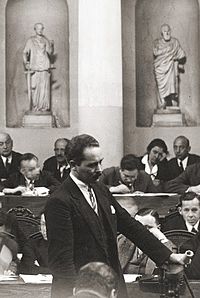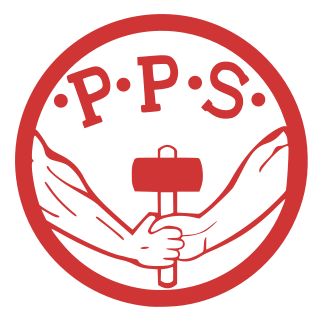
The Polish Socialist Party is a socialist political party in Poland.
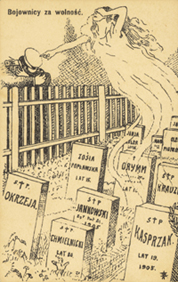
The Combat Organization of the Polish Socialist Party was an illegal Polish guerrilla organization founded in 1904 by Józef Piłsudski. It was the paramilitary wing of the Polish Socialist Party.
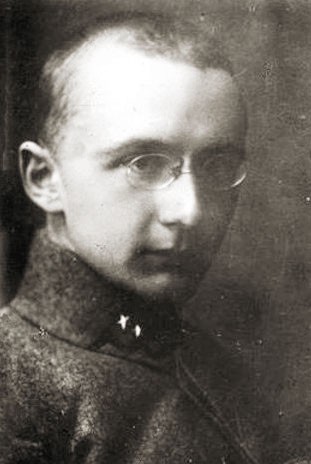
Tadeusz Żuliński, pseudonym Roman Barski, was an activist, member of Polska Partia Socjalistyczna - Frakcja Rewolucyjna and Związek Walki Czynnej, Związek Strzelecki. He was an organiser and commander of Polish Military Organisation (1914–1915).

Franciszek Henryk Siła-Nowicki was a Young Poland poet, a recreational mountaineer, socialist activist, and designer of the Orla Perć High Tatras mountain trail.

Zygmunt Żuławski was a Polish politician, association activist, and socialist. He was a member of:

The Polish Socialist Party – Revolutionary Faction also known as the Old Faction was one of two factions into which the Polish Socialist Party split in 1906. The Revolutionary Faction's primary goal was to restore an independent Poland, which was envisioned as a representative democracy. It saw itself as a spiritual successor to the Red Faction of the 1863 January Uprising, which had the goal of creating an independent Polish-Lithuanian-Ruthenian Commonwealth.

Polish Socialist Party – Left, also known as the Young Faction, was one of two factions into which Polish Socialist Party divided itself in 1906 at its ninth congress. Its primary goal was transform Poland into a socialist country, established through proletarian revolution, and likely a member of some international communist country.
Paweł Zaremba was a Polish historian, publicist, lawyer, radio journalist and publisher. His area of study was primarily history of Poland, history of the United States and history of the interwar period.
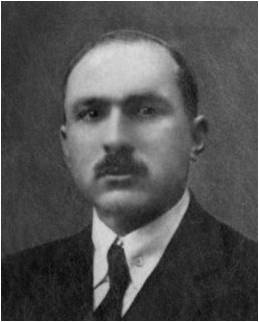
Kazimierz Pużak (1883–1950) was a Polish socialist politician of the interwar period. Active in the Polish Socialist Party, he was one of the leaders of the Polish Secret State and Polish resistance, sentenced by the Soviets in the infamous Trial of the Sixteen in 1945.

Jerzy Zdziechowski was a Polish politician, economist and economical activist, author of economical works.
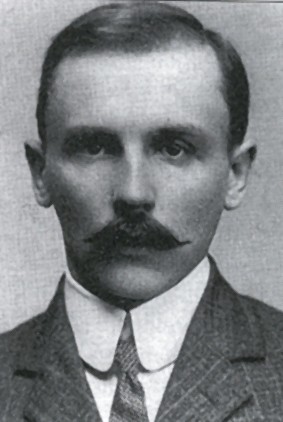
Tytus Filipowicz (1873–1953) was a Polish politician and diplomat.

Zygmunt Stanisław Marek was a Polish socialist politician.

The Movement of the Urban and Rural Working Masses – Freedom, Equality, Independence, commonly known as Polish Socialist Party – Freedom, Equality, Independence and abbreviated as PPS-WRN or just WRN, was an underground organisation in occupied Poland during World War II set up by the activists of the Polish Socialist Party (PPS) and continuing its traditions. The party leadership used the name Central Leadership of the Movement. Within the Political Consultative Committee, the organization used the code name "Koło".

Polish Socialist Party – Freedom, Equality, Independence often referred to simply as Militia PPS-WRN, was a Polish underground paramilitary formation of the Polish Socialist Party – Freedom, Equality, Independence active during the occupation of Poland by Nazi Germany and the Soviet Union in World War II between 1939 and 1945. The total number of clandestine members of MR PPS-WRN reached 30,000 at the time of the Soviet counter-offensive of 1944. They participated in both Operation Tempest against the Nazis and in the Warsaw Uprising of 1944. MR PPS-WRN was created in November 1939 amongst the prewar labour circles in Warsaw, Radom, Kraków, in Upper Silesia (Śląsk) and in the Dąbrowa Basin (Zagłębie) mainly for self-protection. It was supposed to help recreate the Polish prewar police and counter—intelligence services.

Adam Szymon Pragier was a Polish economist, Doctor of Jurisprudence professor at the Free Polish University, socialist activist, politician, member of the Polish Legions and writer. A minister of information and documentation in the Polish government-in-exile in London, he upheld for the rest of his life its legal continuity in the struggle for the restoration of Poland as a sovereign state.
Socialist-Independentist Organisation "Freedom" was a Polish independence underground organisation of members of the Polish Socialist Party operating since 1939 in Vilnius and then in Warsaw from 1939 to 1941.

Antoni Wąsik was a Polish socialist and trade union activist, Siberian exile, and Stalinist prisoner. He was the father of Stanisław Wąsik, an activist of the Polish Socialist Party in exile.

